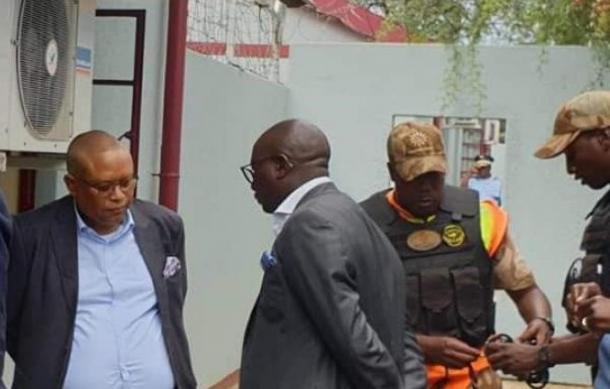
Trial-awaiting former ministers Bernard Esau and Sacky Shangala have expressed disappointment in Namibia's criminal justice system, claiming that all they did was execute their ministerial functions and not conspire to commit corruption, money laundering, and racketeering.
They told the Ombudsman, Basilius Dyakugha, who visited the Windhoek Correctional Facility to inspect the conditions of the cells and other facilities.
The two former ministers, together with their other accused, have now been in the holding cells for four years as trial-awaiting prisoners.
They say they cannot take the blame alone for the amendment to the Fisheries Law that empowered the Minister of Fisheries and Marine Resources to decide on fishing rights and quotas.
Changing laws, the two said, is not the responsibility of one minister, but they must now take the fall. Speaking about them not being granted bail, Shangala urged the Ombudsman to focus on the issue of bail in the next Human Rights Report.
"In your next human rights report, you should write about this. You have a former Attorney General and a Minister of Justice sitting in prison without trial. The judge wants to microwave the trial. I used to defend the system, but I can no longer."
They further claimed that the justice system has been politically weaponized to settle scores with them.
On the question of their long incarceration awaiting trial, Ombudsman Dyakugha, the number one human rights defender in Namibia, agreed.
''It seems we are arresting people before investigation; we need to look into the way we do our criminal justice system.
They also complained about the size of their cell, saying there are no consulting rooms with their lawyers and that there is no space for filing their case documents.
"We have written to the Attorney General to pay for our lawyers' costs so that it can be a fair fight, and all the charges are based on the functions we carried out. One is the appointment of the board that went through Cabinet, but now it is alleged we conspired for a common purpose."
The Anti-Corruption Commission and the Office of the Prosecutor General have on previous occasions pointed to the complexity of the matter, requiring detailed investigations.
Early this month, Prosecutor General Martha Imalwa stated that more time is needed to complete investigations into the extradition of Icelandic suspects to Namibia.
Investigations into the case cost the government N$8 million a year, according to news reports.
The ten high-profile suspects in the Fishrot trial are expected to plead before the High Court on Monday.





